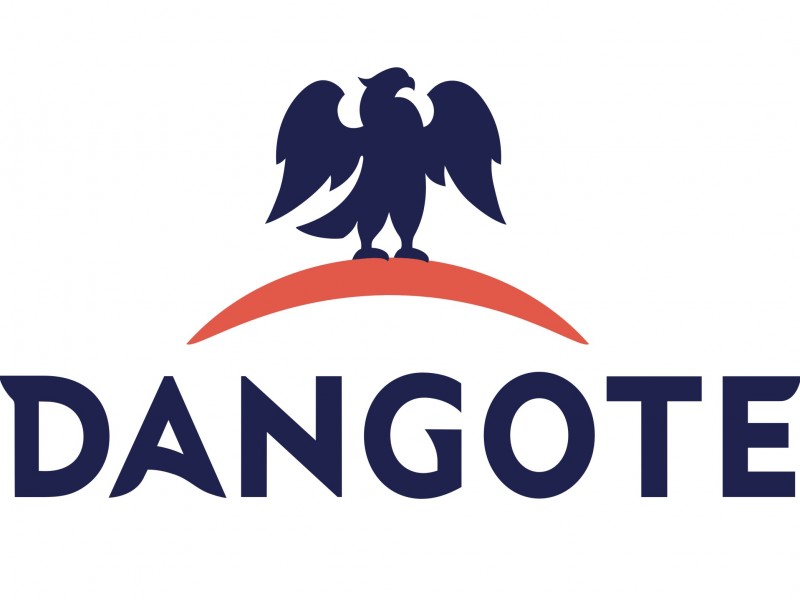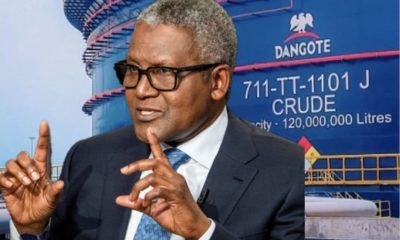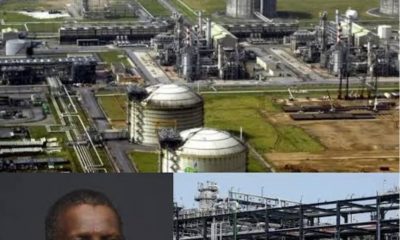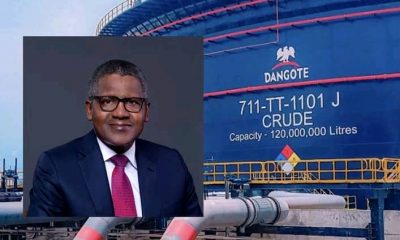Business
TOP 50 BRANDS: DANGOTE NOW THE MOST VALUABLE BRAND IN NIGERIA

Dangote has emerged as the most valuable brand among the top 50 brands in Nigeria for 2018 unveiled at the weekend in Lagos. This is coming barely three months after the brand was adjudged the most admired brand of African origin by Consumers in a brand rating coordinated by South Africa based Brand Leadership in conjunction with Johannesburg Stock Exchange (JSE)
Brand Nigeria, the Agency that coordinated the survey in Nigeria, in its report lauded the efforts of the handlers of the Dangote Brand because this is the first time a Nigerian brand would be achieving the feat since 2013.
Unveiling the list of the top 50 brands at an event attended by top executives of leading corporate organizations in the country as well as stakeholders in Marketing and Advertising Industry, Mr. Taiwo Oluboyede, the Head of Brand Nigeria explained that 46 percent of the top brands amounting to 23 are Nigerian brands.
Giving the highlights of the brands rating, he stated that Promasidor Nigeria Limited emerged the highest gainer jumping 15 points from last year, the followed by the trio of BUA, Nine Mobile and Olam all of which moved 12 points from last year position, while seven brands, Conoil, Channels TV, Union Bank, Access Bank, Chi, Toyota, and GTBank maintained their positions.
He stated further that Fidelity bank came as a first entrant this year and Stallion Group making a fresh return to the top 50 brands this having exited before.
The top 50 brands in Nigeria, Soboyede maintained are the brands that have succeeded in delivering their promises to the consumers. “They are fast growing in value and they are the drivers of our economy. The top brands this year are those that have been able to analyse needs, see opportunities by creating solutions to them and communicating same to the consumers.
“They have also become so good at it that the consumers often refer to them with the name of the need they meet that is their products or services. These brands have found how to deliver something special often times.”
Giving insights into how the evaluation of the top 50 brands was carried out, Soboyede said: “we used the Brand Strength Model (BSM index). It is model that measures a brand’s ability to deliver on its promise to the consumers from the consumer’s point of view. The model uses basic qualitative elements and there are seven variables that goes into the BSM model”.
According to the variables starts with a test of people’s knowledge and affinity with the brands operational in Nigeria. We had a top on the mind survey where people tell us brads that easily come to their mind or brand they can recall.
“Other variables in the model are innovation-this is a test how innovative a brand service delivery is; Quality-this checks some factors that enhance consumer’s confidence in product delivery; Category Leadership-this is a classification of brands within their industry; Online engagements-this checks how active the brand’s online platforms are and how engaging it has been from last evaluation; National Spread-this checks operational presence of a brand across the country.”
Chief Corporate Communication Officer of the Dangote Group, Anthony Chiejina said the management was not surprised at the ranking because the company has continuously deepened and delivered on its core values is to be a world-class enterprise that is passionate about the quality of life of the people and giving high returns to stakeholders.
“And this philosophy is driven by values, which include customer service, entrepreneurship, excellence and leadership. In any of our subsidiaries, the focus is to provide local, value-added products and services that meet the ‘basic needs’ of the populace. Through the construction and operation of large scale manufacturing facilities in Nigeria and across Africa, the Group is focused on building local manufacturing capacity to generate employment, prevent capital flight and provide locally produced goods for the people.
“The expansion of our business especially the Cement which has operations in 14 African countries including Nigeria, Benin, Ghana, Senegal, South Africa and Zambia, among others has added to popularity of our company and the products, Mr. Chiejina stated.
It would be recalled that back in July, the Dangote brand came atop in the ranking of 100 best brands in Africa themed “Brand Africa:100”, the sixth edition announced in Johannesburg, South Africa.
The Brand leadership in the ranking list said of Dangote brand “Nigerian industrial brand Dangote is the number one African brand recalled when consumers are prompted about the continent (Africa) of origin while the South African tele-communications brand MTN is the number one African brand spontaneously recalled irrespective of continent of origin.
The United States sports and fitness brand, Nike, is the overall brand in Africa spontaneously recalled by consumers. The Brand Africa 100 ranking is based on a survey among consumers 18 years and older, conducted in 23 countries across Africa. The countries, representing all African economic regions, collectively account for 75% of the population and the 74% of the GDP of Africa.
African brands rose slightly to account for 17% of the Top 100 brands in Africa, non-African brands retained their firm position in Africa with 83% share of the Top 100 most admired brands in Africa. Brands from Europe leads the table with 40%, North America at 24% and Asia 19%. West Africa 6% with only Nigerian brands and Southern Africa 6%.
The Top 100 is dominated by technology and electronic brands (29%), consumer (non-cyclical) (19%), apparel (15%), automobile (8%), food (7%) and sports & fitness (5%) categories are the top categories.
Business
Nigeria’s Inflation Drops to 15.10% as NBS Reports Deflationary Trend

Nigeria’s headline inflation rate declined to 15.10 per cent in January 2026, marking a significant drop from 27.61 per cent recorded in January 2025, according to the latest Consumer Price Index (CPI) report released by the National Bureau of Statistics.
The report also showed that month-on-month inflation recorded a deflationary trend of –2.88 per cent, representing a 3.42 percentage-point decrease compared to December 2025. Analysts say the development signals easing price pressures across key sectors of the economy.
Food inflation stood at 8.89 per cent year-on-year, down from 29.63 per cent in January 2025. On a month-on-month basis, food prices declined by 6.02 per cent, reflecting lower costs in several staple commodities.
The data suggests a sustained downward trajectory in inflation over the past 12 months, pointing to improving macroeconomic stability.
The administration of President Bola Ahmed Tinubu has consistently attributed recent economic adjustments to ongoing fiscal and monetary reforms aimed at stabilising prices, boosting agricultural output, and strengthening domestic supply chains.
Economic analysts note that while the latest figures indicate progress, sustaining the downward trend will depend on continued policy discipline, exchange rate stability, and improvements in food production and distribution.
The January report provides one of the clearest indications yet that inflationary pressures, which surged in early 2025, may be moderating.
Bank
Alpha Morgan to Host 19th Economic Review Webinar

Alpha Morgan to Host 19th Economic Review Webinar
In an economy shaped by constant shifts, the edge often belongs to those with the right information.
On Wednesday, February 25, 2026, Alpha Morgan Bank will host the 19th edition of its Economic Review Webinar, a high-level thought leadership session designed to equip businesses, investors, and individuals with timely financial and economic insight.
The session, which will hold live on Zoom at 10:00am WAT and will feature economist Bismarck Rewane, who will examine the key signals influencing Nigeria’s economic direction in 2026, including policy trends, market movements, and global developments shaping the local landscape.
With a consistent track record of delivering clarity in uncertain times, the Alpha Morgan Economic Review continues to provide practical context for decision-making in a dynamic environment.
Registration for the 19th Alpha Morgan Economic Review is free and can be completed via https://bit.ly/registeramerseries19
It is a bi-monthly platform that is open to the public and is held virtually.
Visit www.alphamorganbank to know more.
Business
GTBank Launches Quick Airtime Loan at 2.95%

GTBank Launches Quick Airtime Loan at 2.95%
Guaranty Trust Bank Ltd (GTBank), the flagship banking franchise of GTCO Plc, Africa’s leading financial services group, today announced the launch of Quick Airtime Loan, an innovative digital solution that gives customers instant access to airtime when they run out of call credit and have limited funds in their bank accounts, ensuring customers can stay connected when it matters most.
In today’s always-on world, running out of airtime is more than a minor inconvenience. It can mean missed opportunities, disrupted plans, and lost connections, often at the very moment when funds are tight, and options are limited. Quick Airtime Loan was created to solve this problem, offering customers instant access to airtime on credit, directly from their bank. With Quick Airtime Loan, eligible GTBank customers can access from ₦100 and up to ₦10,000 by dialing *737*90#. Available across all major mobile networks in Nigeria, the service will soon expand to include data loans, further strengthening its proposition as a reliable on-demand platform.
For years, the airtime credit market has been dominated by Telcos, where charges for this service are at 15%. GTBank is now changing the narrative by offering a customer-centric, bank-led digital alternative priced at 2.95%. Built on transparency, convenience and affordability, Quick Airtime Loan has the potential to broaden access to airtime, deliver meaningful cost savings for millions of Nigerians, and redefine how financial services show up in everyday life, not just in banking moments.
Commenting on the product launch, Miriam Olusanya, Managing Director of Guaranty Trust Bank Ltd, said: “Quick Airtime Loan reflects GTBank’s continued focus on delivering digital solutions that are relevant, accessible, and built around real customer needs. The solution underscores the power of a connected financial ecosystem, combining GTBank’s digital reach and lending expertise with the capabilities of HabariPay to deliver a smooth, end-to-end experience. By leveraging unique strengths across the Group, we are able to accelerate innovation, strengthen execution, and deliver a more integrated customer experience across all our service channels.”
Importantly, Quick Airtime Loan highlights GTCO’s evolution as a fully diversified financial services group. Leveraging HabariPay’s Squad, the solution reinforces the Group’s ecosystem proposition by bringing together banking, payment technology, and digital channels to deliver intuitive, one-stop experiences for customers.
With this new product launch, Guaranty Trust Bank is extending its legacy of pioneering digital-first solutions that have redefined customer access to financial services across the industry, building on the proven strength of its widely adopted QuickCredit offering and the convenience of the Bank’s iconic *737# USSD Banking platform.
About Guaranty Trust Bank
Guaranty Trust Bank (GTBank) is the flagship banking franchise of GTCO Plc, a leading financial services group with a strong presence across Africa and the United Kingdom. The Bank is widely recognized for its leadership in digital banking, customer experience, and innovative financial solutions that deliver value to individuals, businesses, and communities.
About HabariPay
HabariPay is the payments fintech subsidiary of GTCO Plc, focused on enabling fast, secure, and accessible digital payments for individuals and businesses. By integrating payments and digital technology, HabariPay supports innovative services that make everyday financial interactions simpler and more seamless.
Enquiries:
GTCO
Group Corporate Communication
[email protected]
+234-1-2715227
www.gtcoplc.com
-

 celebrity radar - gossips6 months ago
celebrity radar - gossips6 months agoWhy Babangida’s Hilltop Home Became Nigeria’s Political “Mecca”
-

 society6 months ago
society6 months agoPower is a Loan, Not a Possession: The Sacred Duty of Planting People
-

 society5 months ago
society5 months agoReligion: Africa’s Oldest Weapon of Enslavement and the Forgotten Truth
-

 news6 months ago
news6 months agoTHE APPOINTMENT OF WASIU AYINDE BY THE FEDERAL GOVERNMENT AS AN AMBASSADOR SOUNDS EMBARRASSING










You must be logged in to post a comment Login